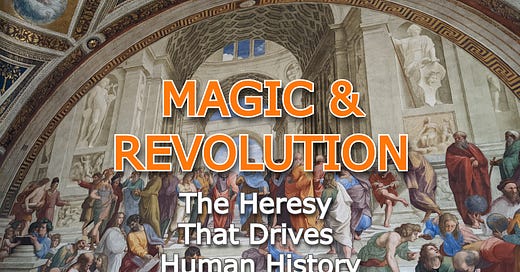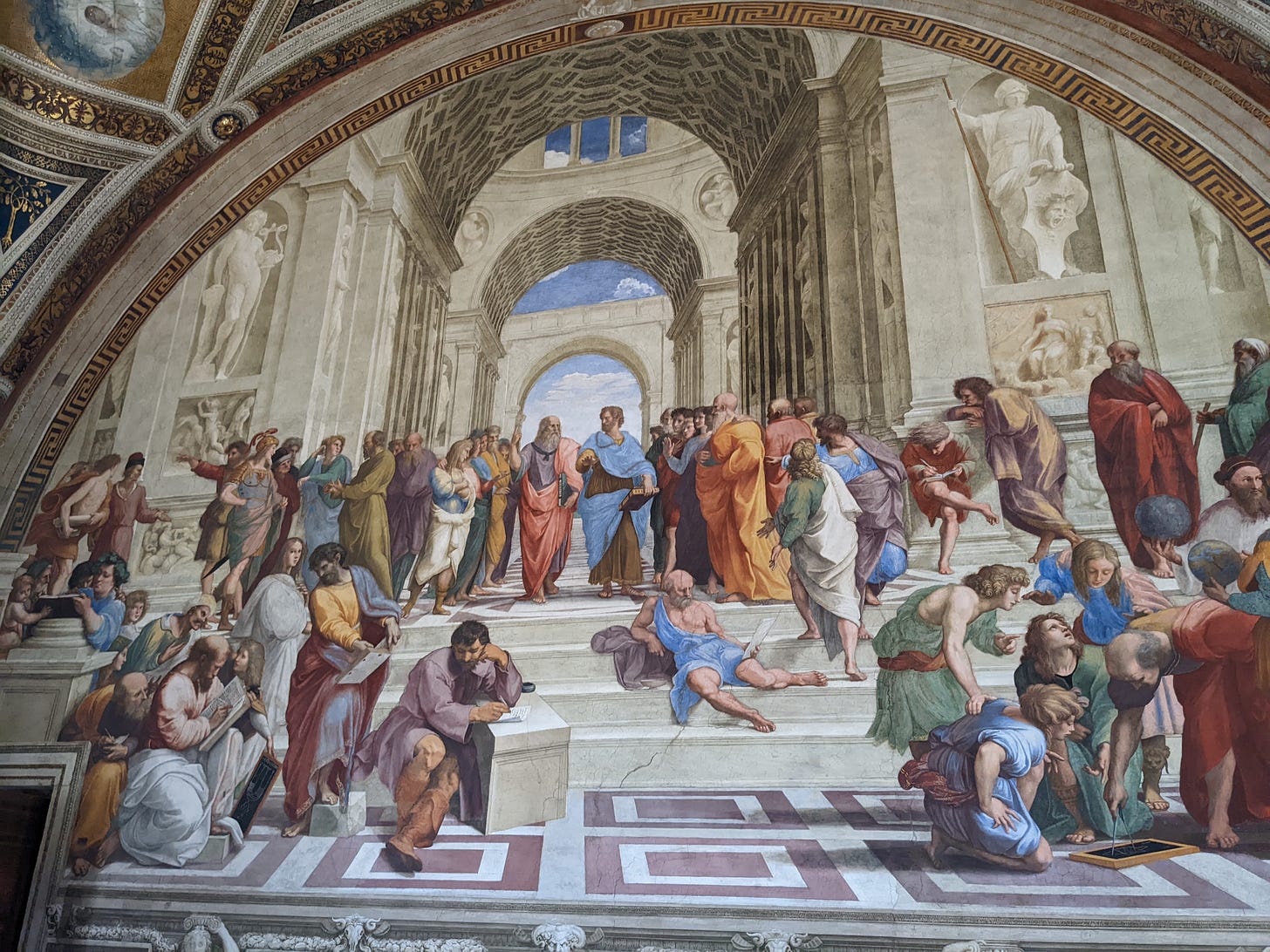I. Introduction
Everything is about economics, even our bedrock conceptions of reality itself. When the slave economy of the Roman Empire collapsed, Christianity replaced a pagan conception of reality. A thousand years later, when the peasant economy of the Middle Ages ended, science replaced that Christianity. Both Christianity and science began as scrappy, upstart revolts against the powerful. And both ideologies made compromises to fit into new power structures.
A crumbling economic system means a loss of authority and of a centralized conception of reality. That’s when whispers of magic at society’s fringe begin finding sympathetic ears. It happened at the end of the Roman Empire and at the end of the Middle Ages. And it’s happening again today as our own economic system teeters on the brink.
II. Magic
There are two realities. There’s the mental realm where you instruct your hand to make a fist. And then there’s the physical realm where your hand actually closes.
The authorities in all times and places prefer us to regard the physical realm as primary reality—because the physical realm is where we show up to work every morning to make money for them. That’s where their bank accounts and their armies are located. They have no jurisdiction over the mental realm.
But the greatest secret in history is that the mental realm is actually primary reality. Physical reality is downstream of it, not upstream. This secret has gone by many names over the centuries, but it’s most recently been called “magic”. The notion is that our minds both observe and create the universe. Just like in our dreams, where our brains simultaneously conjure up vast dreamscapes while also experiencing them at the same time. The magical paradigm holds that since the observable universe is a product of the mind, the mind can affect it. Just like a lucid dreamer can affect a dream.
This philosophical controversy was immortalized in 1511 by Raphael in his School of Athens painting. At the center of the canvas Aristotle argues for the primacy of the physical realm with an overturned palm, while Plato champions the mental realm with an upward-pointing finger.
III. Caesars & Slavery
As the slave economy of Rome collapsed, it was taken over by Christianity. When the Empire was at its height, Christians were thrown to lions in the Colosseum. But as the Empire circled the drain, the upstart faith exploded in popularity. During the twilight of the Empire, it got so popular that the Caesars tried to stem their waning power by adopting Christianity as the official state religion of Rome.
Plato’s insistence on the primacy of a transcendent realm became the Christian idea of heaven. And the stories about Christ are nothing if not magical. Jesus changed water into wine and—for his grand finale—came back from the dead. He was a wizard if ever there was one. The original message of Christianity was that everyone has the potential to become a wizard like Jesus. Scripture still bears the evidence. In the 82nd Psalm God tells us, “Ye are gods; and all of you are children of the most High.” Though the King James version renders John 10:36 as “I am the Son of God”, the original Greek reads “I am a Son of God”. In the early days of the faith, Christianity taught that we are all God’s children, capable of the same magic attributed to Jesus.
Of course, the Roman authorities couldn’t have their subjects thinking of themselves as god-like. Their society was wholly dependent on slaves, and people who think of themselves as gods don’t take orders well. Transcendence is terrible for productivity.
Fortunately for the Caesars there were many Christian sects, like Gnosticism or Donatism, scattered throughout the Empire. From among these they endorsed Nicene Christianity as the new state religion because the Nicene Creed emphasizes the exclusive divinity of Jesus. For political reasons, the Caesars had no choice but to accept Jesus as the Son of God. But they drew the line right there; Jesus was to be an only child. Aspiring to be like Jesus in the sense that one could perform similar miracles became the severest form of heresy in the new Roman Catholic Church.
IV. Popes & Feudalism
The Middle Ages came to an end in the wake of the Black Death. With a third of the European population moldering in early graves, the surviving peasantry realized they could dictate prices for their labor. The feudal economic system of peasants and lords unraveled. Just as in the final decades of the Roman Empire, magic exploded in popularity once again. The Roman Catholic Church responded to rampant heresy with the Inquisition. As Christians were once thrown to lions by Roman authorities, those who refused to color within the lines defined by Christian authorities were tortured and burned at the stake.
The revolt against Christian authority began with the Medici of Florence. This banking family risked charges of heresy by bankrolling a revival of pre-Christian culture. We now call that the Renaissance. And they were obsessed with magic. They considered themselves alchemists and drank potions made of ground gems. While Michelangelo and Botticelli revived Greco-Roman art techniques, other Medici agents scoured old monasteries for ancient books of pre-Christian magic. They hit pay-dirt when they discovered the Corpus Hermeticum. “If then you do not make yourself equal to God,” it says, “you cannot apprehend God; for like is known by like.” That crumbling manuscript also suggests looking for God in a hidden mental realm. “Thought itself is hidden from sight;” it reads “and if even the thought which is within you is hidden from your sight, how can He, being in himself, be manifested to you through your bodily eyes?”
International banking houses like the Medici went on to displace the Popes atop the geopolitical hierarchy. But the magical insight was no more welcome with these bankers than it was when the Caesars and the Popes were the masters of empire. They want us going to work and paying them interest on their loans. And so, just as the magical hippie movement of Jesus morphed into the rigid authority of the Popes, Renaissance magic morphed into the authority of science. Astrologers gradually became astronomers. Alchemists became chemists. Pointed wizard hats and robes were exchanged for white lab coats and clipboards. And the magical insight was once again lost to history.
V. Bankers & Capitalism
Like Christianity, science has come full circle from scrappy upstart to embedded institution. It’s the authority that defines reality. The vast majority take scientists at their word instead of running experiments or reading peer-reviewed papers. We don’t burn heretics at the stake anymore. But we’ll still scorn and ostracize anyone who doesn’t believe the dictates of our modern priesthood. And like Christianity, science lost the magical insight during it’s genesis. It still considers the physical realm to be primary reality, and the mental realm to be derivative.
But in the past century, the shovel of science has clunked into some unexpected treasure chests. The Placebo Effect demonstrates that mental beliefs of patients affect physical outcomes. And the Copenhagen Interpretation of quantum mechanics suggests that atomic particles only pop into existence after observation. Apparently those building blocks of reality exist only as probabilities before someone looks at them. Neither of those things would be possible unless the mental realm is giving rise to the physical realm. Now a great Replication Crisis has gripped science, in which long-accepted results from old experiments are turning out to be impossible to recreate. The entire discipline stands in a state of unresolved tension.
For 600 years, science has been the seed-corn of capitalism. Entrepreneurs take out loans from bankers, and repay those loans by bringing science’s labor-saving technologies to market. But a system that divides people into employers and employees cannot survive the introduction of too much labor-saving technology. If too few employees are demanded, they can’t negotiate for high enough wages to buy all the products employers wish to sell. For two generations now, we’ve used debt to finance the gap between what our employers want to pay us versus what they want to sell us. Now every category of debt sits at historical records. The 2008 Financial Crisis was just the conductor rousing the orchestra with a tap of the baton.
VI. Conclusion
The transition from feudalism to capitalism is epitomized by the discovery that the Earth moves around the sun—not the other way around as the Christian authorities claimed. It was a wholesale inversion of reality. Up until that time, any fool could see the sun “moving” across the sky. But that illusion was broken forever, and the credibility of church authorities never recovered.
As the clock ticks on the modern capitalist economic model, our reality is overdue for another inversion. We are about to realize the old magical view that the mental realm is our primary reality, and that the observed physical realm is merely derivative. Just as the Greek philosopher Plato suggested thousands of years ago. It sounds crazy. But so did people advocating for a heliocentric model of the solar system, when the sun could clearly be observed in motion.
Reality has already ruptured along political lines, with red and blue factions apparently living in totally different universes. And we now have government officials taking UFOs seriously, adding even more spice to the chaos. We’ve entered into surreal times, and things are going to get a lot weirder from here. Reality is going over the falls in the same barrel as our economic system. The moment is perfect for magic to stride once again onto the stage of history.





